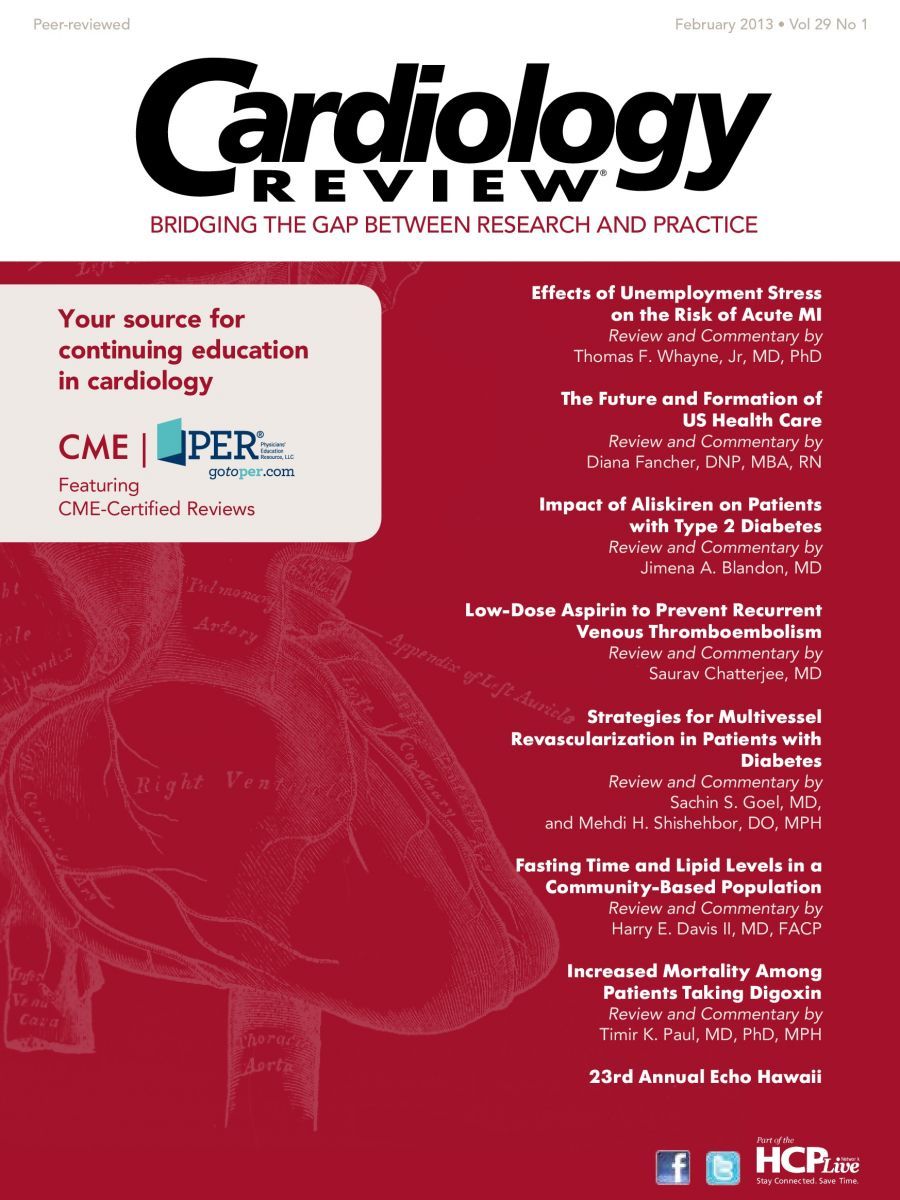Publication
Article
Cardiology Review® Online
News & Trends
Apixaban Approved for Reduction of Risk of Stroke, Blood Clots in AF Patients
In the last few days of 2012, the FDA approved the oral factor Xa inhibitor anticoagulant apixaban (Eliquis) to reduce the risk of stroke and systemic embolism in patients with nonvalvular atrial fibrillation (AF).
The agency based the approval decision on data from the ARISTOTLE clinical trial comparing apixaban with warfarin, which involved more than 18,000 patients. The trial showed that patients taking apixaban had fewer strokes than those who took warfarin.
Apixaban labeling contains a boxed warning stating that patients who discontinue apixaban are at an increased risk of thrombotic events. An increased risk of stroke was observed following discontinuation of apixaban in clinical trials in patients with nonvalvular atrial fibrillation. If anticoagulation with apixaban must be discontinued for a reason other than pathological bleeding, coverage with another anticoagulant should be strongly considered.
Product labeling also notes that apixaban increases the risk of bleeding and can cause serious, potentially fatal bleeding. The most common and serious adverse events associated with the medication were related to bleeding.
Apixaban is a product of Bristol-Myers Squibb (BMS) and will be co-marketed by BMS and Pfizer.
Dabigatran Should Not Be Used in Patients with Mechanical Prosthetic Heart Valves
The FDA has notified health care practitioners and patients that dabigatran etexilate mesylate (Pradaxa) should not be used to prevent stroke or major thromboembolic events in patients with mechanical prosthetic heart valves. The agency is communicating this recommendation after the RE-ALIGN clinical trial was halted because study subjects who used dabigatran were more likely to experience strokes, heart attacks, and the formation of blood clots on mechanical heart valves than were users of warfarin. There was also more bleeding after valve surgery in the patients using dabigatran than in the warfarin users. The FDA’s recommendations can be found at http://www.fda.gov/Drugs/DrugSafety/ucm332912.htm.
Dabigatran is not approved for patients with AF caused by heart valve problems, and the FDA is requiring a contraindication to be added to the labeling of dabigatran warning against use in patients with mechanical heart valves.
Niacin/Laropiprant Products Will Be Suspended Worldwide
The marketing, supply, and authorizations of 3 identical niacin/laropiprant products (Tredaptive, Pelzont, and Trevaclyn) used to treat adults with dyslipidemia will be suspended across the European Union following the recommendation of the European Medicines Agency (EMA) at its January 2013 meeting. Merck, which markets the combination, has begun working with regulatory agencies in all countries where the medication is currently available to suspend availability of the product and work on communications for health care providers. The timetable for the suspension will be based on the regulations and processes of each individual nation.
The decision was made based on EMA’s assessment of data related to safety concerns about the products. The HPS-2 THRIVE study failed to show any clinical benefit of adding extendedrelease niacin/laropiprant to statin therapy. The combination did not significantly reduce the risk of the composite of coronary deaths, nonfatal myocardial infarctions, strokes, or coronary revascularizations compared with statin therapy, but it did significantly increase the risk of nonfatal but serious side effects.
Merck announced that it did not intend to seek approval for the drug from the FDA. The company recommends that physicians cease prescribing Tredaptive or the identical products, and review patients’ treatment plans in a timely manner to discontinue it and consider other changes in therapy.





